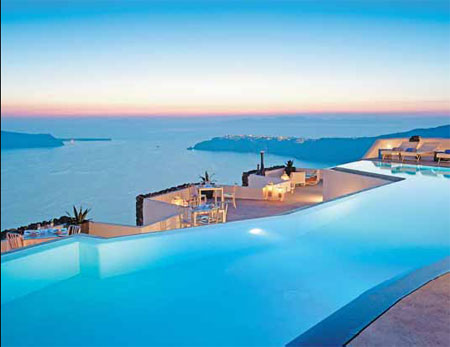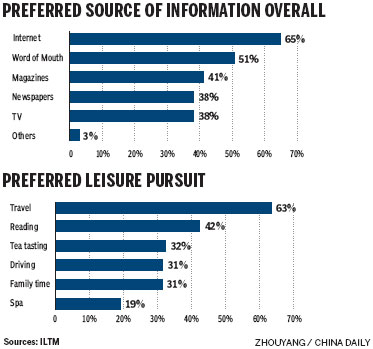Survey: New rich developing taste for tourism
Updated: 2013-06-03 13:22
(China Daily)
|
||||||||
 |
|
Grace Santorini, a boutique hotel in Greece. Tourism reigns supreme as the No 1 leisure pursuit for the newly wealthy in China. Provided to China Daily |
China's luxury travel market will continue to grow in the near future thanks to its emerging wealthy class.
Last year, there were approximately 8,100 billionaires in China, up 600 from last year.
Among them, some 2,700 have been identified and an estimated 5,400 more are believed to exist.
Those are said to have "hidden" wealth.
Around 600 individuals achieved 1 billion dollars or more in assets last year, 263 individuals of whom have been identified and 340 of whom are classified as having "hidden" wealth.
Most of them are from first-tier cities, such as Shanghai, Beijing, Shenzhen and Guangzhou.
Others are from such second-tier cities as Tianjin, Nanjing, Wuhan, Shenyang, Xi'an, Chengdu, Hangzhou, Jinan, Qingdao, Dalian, Ningbo and Suzhou.
Official statistics show tourism reigns supreme as the number one leisure pursuit for China's newly wealthy.
Some 63 percent of surveyed high-net-worth individuals listed travel as their preferred leisure activity, an annual increase of 2 percent.
Their demands are becoming more diverse, and they are searching for a distinctive travel experience, according to an industry expert.
Alison Gilmore, director of the International Luxury Travel Market, said that ILTM events are hubs created exclusively to develop the business of bespoke luxury travel.
"Agents and buyers attending ILTM Asia from across the region will have the opportunity to ensure they're ahead of the game in meeting their clients' increasing demands during activities such as educational seminars and business networking," Gilmore said.
According to statistics from the National Tourism Administration, the number of outbound Chinese tourists totaled 83 million in 2012, an annual increase of 18.4 percent.
The market is now the largest in the world, ahead of that of Germany and the United States.
It is expected that the outbound tourism market in China will continue to grow this year, with the number of tourists projected to reach 94 million.
Other sectors
For China's emerging middle-class, reading is the second-most popular leisure activity.
Tea tasting and driving remain steady in third and fourth and spending time with one's family remains in fifth place.
There is little difference between the top five preferred leisure pursuits among high-net-worth individuals in the first-, second-and third-tier cities.
However, spas and wine tasting are much more popular among this group in the first-tier cities.
On the other hand, food safety fears, among other factors, have prompted the nation's wealthy to focus an increasing amount of their attention on improving their health, particularly through physical exercise.
In first-tier cities, the wealthy prefer yoga, tennis and horse-riding, while in second- and third-tier cities, they are more interested in hiking and skiing.
In 2012, swimming surpassed golf as the preferred sport among wealthy Chinese individuals and remains the most popular this year.
Golf, hiking, yoga and badminton make up the remaining top five preferred sports.
Yoga is the first choice for women, 48 percent of whom selected it, whereas the figure is a mere 9 percent among men.
Horse-riding is up from 7 percent last year to 15 percent this year and ranks sixth.
Chinese entrepreneurs enjoy swimming because it fits in well with their irregular lifestyle, according to a survey.
Most Chinese entrepreneurs, unlike their Western counterparts live in luxury compounds that usually have a clubhouse and swimming pool, according to the report.
For wealthy Chinese in first-, second- and third-tier cities, the Internet is the most popular source of information.
Word of mouth is also important, with 51 percent of respondents listing it as a preferred information source.
Some 41 percent of wealthy individuals in first-tier cities get their information from magazines, which are comparatively more popular in second-and third-tier cities, with 45 percent.
Women noticeably prefer the Internet and magazines compared to men, who prefer newspapers, according to the survey.
Wealthy Chinese use the Internet 6.2 days per week on average and use other media approximately 3 to 4 days per week.
Some 98 percent browse the Internet and 91 percent read magazines.
Micro-blogging is most popular among women and the younger generation.
About 64 percent of wealthy Chinese women use micro-blogging every day and among high-net-worth individuals under 30, the figure is 66 percent.
The number of wealthy individuals who use their phones to e-mail is up to 59 percent.
Women and young wealthy frequently use their phones to chat with friends, 36 percent and 38 percent, respectively, and are using chat tools such as Wechat and Whatsapp to do so.


 'Taken 2' grabs movie box office crown
'Taken 2' grabs movie box office crown
 Rihanna's 'Diamonds' tops UK pop chart
Rihanna's 'Diamonds' tops UK pop chart
 Fans get look at vintage Rolling Stones
Fans get look at vintage Rolling Stones
 Celebrities attend Power of Women event
Celebrities attend Power of Women event
 Ang Lee breaks 'every rule' to make unlikely new Life of Pi film
Ang Lee breaks 'every rule' to make unlikely new Life of Pi film
 Rihanna almost thrown out of nightclub
Rihanna almost thrown out of nightclub
 'Dark Knight' wins weekend box office
'Dark Knight' wins weekend box office
 'Total Recall' stars gather in Beverly Hills
'Total Recall' stars gather in Beverly Hills
Most Viewed
Editor's Picks

|

|

|

|

|

|
Today's Top News
Shenzhou X astronaut gives lecture today
US told to reassess duties on Chinese paper
Chinese seek greater share of satellite market
Russia rejects Obama's nuke cut proposal
US immigration bill sees Senate breakthrough
Brazilian cities revoke fare hikes
Moody's warns on China's local govt debt
Air quality in major cities drops in May
US Weekly

|

|








